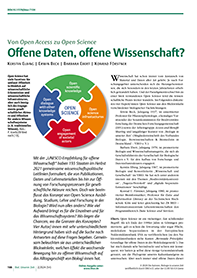Offene Daten, offene Wissenschaft?
DOI:
https://doi.org/10.11576/biuz-7134Keywords:
Open Data, Open Access, Open Science, FAIR-Prinzipien, Forschungsdaten, Biologische DatenAbstract
Open science means a paradigm shift: Deposited in a database, data from other researchers are used like data that have been collected by themselves for new research questions, usually of an overarching nature. This approach does not only apply to data which are selected for a publication but also to all trustworthy data, so-called primary data. Sharing data results in a considerable added value. Thus, researchers are obliged to deposit their own research data as “open data” in public databases. In particular in combination with artificial intelligence, this generates an enormous scientific potential. To enable its unfolding, it is necessary that those data researchers provide must meet the principles: findability, accessibility, interoperability, and reusability (FAIR).
These principles underlie the EU Data Act as well as the EU Data Governance Act, both of them representing the pillars of the European Data Strategy, and are reflected in the individual laws of the European member states. Research data in biosciences deal with different contents such as: biodiversity and occurrence data, taxon data, environmental and ecological data, non-molecular analysis data, and molecular – predominantly – sequence data. They are stored in domain-specific databases and are at the scientific community’s free disposal.
A difficult matter is the right of data ownership, as this question cannot be answered easily. Several aspects must be considered, e. g. ingenuity/originality of the scientific project and its approach, the purpose of the use of the data, the funding of the project, as well as the protection of the data (e. g. for patents) for a defined period of time. Admittedly, the great potential of free access to data is not without dark sides, especially with regard to the misuse of biodata that are actually useful (Dual Use of Concern). Nevertheless, Open science, supported by the binding UNESCO Recommendation, is well on the way of becoming a lived and good scientific practice.


